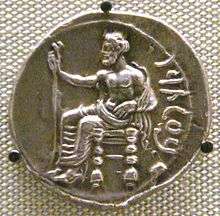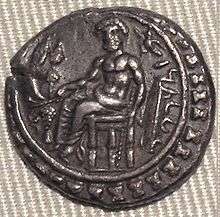Baaltars
Baaltars (combination of "Baal" and "Tarsus"; Aramaic: בעלתרז) was the tutelary deity of the city of Tarsus in the Persian Empire.[1] His depiction appears on coins of the Persian governors (satraps) of Cilicia at Tarsus before the conquests of Alexander the Great, in the 5th and 4th century BCE, such as Datames, Pharnabazes,[2] and Mazaios,[3] and also on coins of the early Seleucid Empire.[1] The equivalent of Baaltars for the Greeks was Zeus.

Silver stater of Pharnabazus as Satrap of Cilicia (379-374 BCE), depicting a seated Baaltars. British Museum.

Silver coin of Datames (r. 385-362 BCE) with the God Baaltars on a throne, seated left, torsos facing, holding grapes, grain ear, and eagle in right hand, scepter in left hand, surrounded by the city walls. Cabinet des Médailles.
Notes
gollark: Also, if other people can use it, then we're back to square one: adding features for them.
gollark: h🌵i
gollark: hi
gollark: <@229624651314233346> hi
gollark: <@229624651314233346> Hi
References
- Wayne G. Sayles, Ancient Coin Collecting VI: Non-Classical Cultures Krause Publications, 1999, ISBN 978-0-87341-753-2
- James Hastings, S R Driver, A Dictionary of the Bible: Volume IV, Part II (Shimrath - Zuzim) The Minerva Group, Inc., 2004 ISBN 978-1-4102-1729-5
This article is issued from Wikipedia. The text is licensed under Creative Commons - Attribution - Sharealike. Additional terms may apply for the media files.